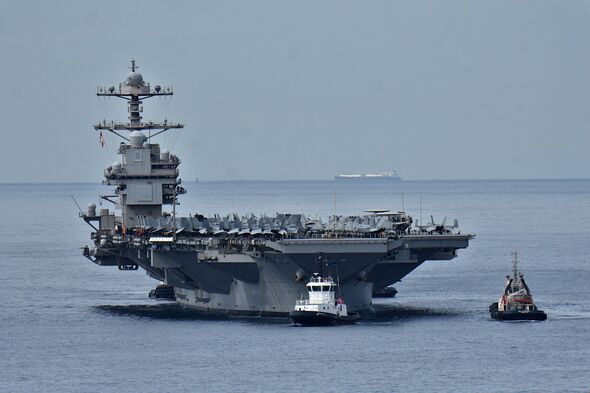World
USS Gerald R. Ford Heads to Caribbean Amid Rising Tensions

The United States is deploying the USS Gerald R. Ford, the world’s largest aircraft carrier, to the Caribbean amid escalating tensions regarding alleged drug trafficking activities. The deployment comes as the administration of President Donald Trump faces accusations of “fabricating war” in the region, particularly concerning Venezuela.
Currently stationed in the Mediterranean, the USS Gerald R. Ford is expected to reach Venezuelan waters within a week. The carrier, weighing 100,000 tons and capable of accommodating up to 90 aircraft, is accompanied by three of the five destroyers in its strike group. This deployment significantly enhances American military presence off the South American coast, where it joins eight other warships and a nuclear-powered submarine.
Military Objectives and Regional Impact
The Pentagon has stated that the USS Gerald R. Ford will strengthen the United States’ ability to detect, monitor, and disrupt illicit activities that threaten national security. This move follows a series of strikes targeting vessels accused of drug trafficking off the coast of Venezuela, resulting in at least 43 fatalities. Secretary of War Pete Hegseth commented on the recent military actions, claiming that a recent strike targeted a boat involved in narcotics smuggling, eliminating all six individuals aboard, whom he labeled “narco-terrorists.”
The ongoing operation has raised concerns among lawmakers and human rights organizations regarding its legality. Trump’s administration has classified drug cartels as unlawful combatants, framing the situation as an “armed conflict” similar to the legal justifications employed by the Bush administration following the September 11 attacks.
Venezuela’s Response and Controversy
In response to the military escalation, Venezuelan President Nicolás Maduro condemned the U.S. actions, alleging that the Trump administration is fabricating a conflict. In a national address, he stated, “They promised they would never again get involved in a war and they are fabricating a war that we will avoid.” Maduro denied claims that Venezuela produces cocaine, asserting the nation does not cultivate coca leaves.
Furthermore, the U.S. has accused Maduro of leading the organized crime group Tren de Aragua, a claim he refutes. Tren de Aragua, originating from a Venezuelan prison, is primarily associated with contract killings and human smuggling rather than large-scale drug trafficking, though it was designated as a terrorist organization by Washington in February.
The arrival of the USS Gerald R. Ford heralds a significant increase in U.S. military capabilities in the Caribbean, with potential implications for regional stability and international relations. As tensions mount, the situation remains dynamic, with both military and diplomatic actions unfolding rapidly.
-

 Health3 months ago
Health3 months agoNeurologist Warns Excessive Use of Supplements Can Harm Brain
-

 Health3 months ago
Health3 months agoFiona Phillips’ Husband Shares Heartfelt Update on Her Alzheimer’s Journey
-

 Science1 month ago
Science1 month agoBrian Cox Addresses Claims of Alien Probe in 3I/ATLAS Discovery
-

 Science1 month ago
Science1 month agoNASA Investigates Unusual Comet 3I/ATLAS; New Findings Emerge
-

 Science4 weeks ago
Science4 weeks agoScientists Examine 3I/ATLAS: Alien Artifact or Cosmic Oddity?
-

 Entertainment4 months ago
Entertainment4 months agoKerry Katona Discusses Future Baby Plans and Brian McFadden’s Wedding
-

 Science4 weeks ago
Science4 weeks agoNASA Investigates Speedy Object 3I/ATLAS, Sparking Speculation
-

 Entertainment4 months ago
Entertainment4 months agoEmmerdale Faces Tension as Dylan and April’s Lives Hang in the Balance
-

 World3 months ago
World3 months agoCole Palmer’s Cryptic Message to Kobbie Mainoo Following Loan Talks
-

 Science4 weeks ago
Science4 weeks agoNASA Scientists Explore Origins of 3I/ATLAS, a Fast-Moving Visitor
-

 Entertainment4 months ago
Entertainment4 months agoLove Island Star Toni Laite’s Mother Expresses Disappointment Over Coupling Decision
-

 Entertainment3 months ago
Entertainment3 months agoMajor Cast Changes at Coronation Street: Exits and Returns in 2025









